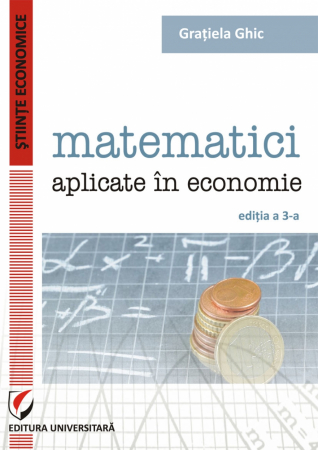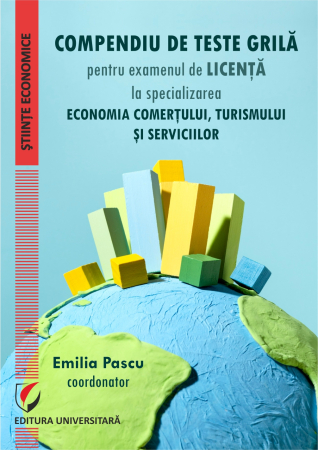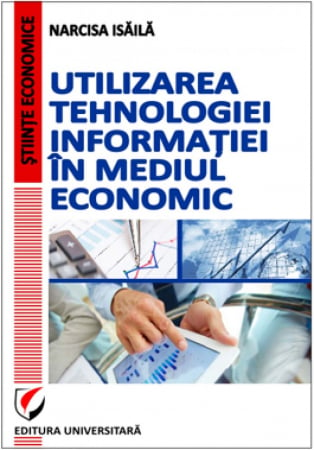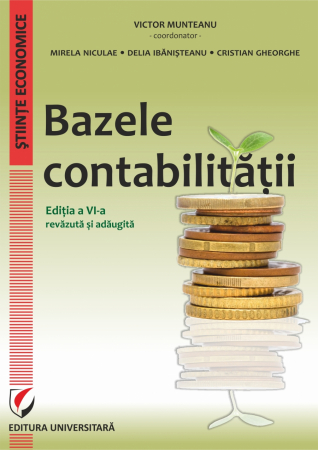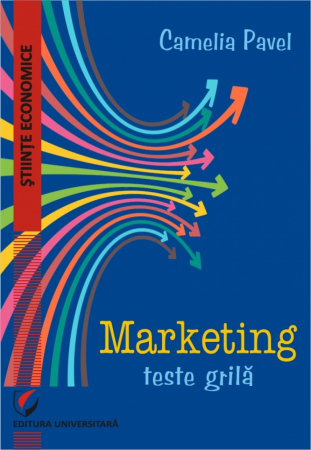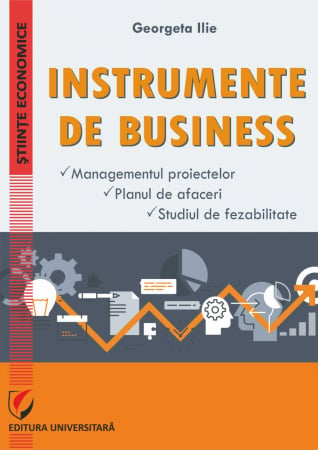Manuscript proposals: [email protected] / 0745 204 115 //// Tracking orders Individuals / Sales: 0745 200 357 / Orders Legal entities: 0721 722 783
Publisher: Editura Universitară
Author: Daniel Stefan
ISBN: 978-606-28-0040-6
DOI: 10.5682/9786062800406
Publisher year: 2014
Edition: I
Pages: 240
Product Code:
9786062800406
Do you need help?
0745 200 357
- Description
- Download (1)
- Authors
- Content
- More details
- Reviews (0)
This paper is just an introduction to the issues of entrepreneurship, competition and "economic warfare". In our opinion, it remains to be established at what threshold the normal competition between economies turns into war? During a "military war", this threshold is clearly defined. In the post-1945 peace periods, competition and economic warfare often intertwine. It seems that some Western states perceive China and emerging countries as "enemies" or political and economic adversaries.
In this case, too, the thesis applies that national interests "command" the relations between all the states holding sovereignty. National interests (economic, political, military, cultural) determine the action of states and the relations between them. National interests translate into political and other goals and objectives; military, security and economic interests take precedence.
In this case, too, the thesis applies that national interests "command" the relations between all the states holding sovereignty. National interests (economic, political, military, cultural) determine the action of states and the relations between them. National interests translate into political and other goals and objectives; military, security and economic interests take precedence.
-
Entrepreneurship, Competition and Economic War
Download
DANIEL STEFAN - Coordonator
ROXANA DUMITRACHE
CRISTIAN BAHNAREANU
ROXANA DUMITRACHE
CRISTIAN BAHNAREANU
INTRODUCTION / 7
Dr. D. Stefan
Chapter I. COMPETITION, DEVELOPMENT AND GLOBALIZATION / 12
Dr. D. Stefan, Dr. R. Dumitrache
Chapter II. THE ECONOMIC WAR. CONCEPT AND HISTORY / 41
Dr. D. Stefan
Chapter III. DYNAMICS OF SOME "ECONOMIC WARS" / 77
Dr. D. Stefan
Chapter IV. REGIONAL, MULTINATIONAL ORGANIZATIONS AND SMEs / 98
Dr. D. Stefan
Chapter V. EVOLUTIONS AND INVOLVEMENTS IN THE GLOBAL ECONOMY (2009-2011) / 147
Dr. C. Bahnareanu
Chapter VI. THE WORLD BETWEEN THE CRISIS, STABILIZATION AND RELEASE (2012-2014) / 194
Dr. D. Stefan, Dr. C. Bahnareanu
CONCLUSION / 234
SELECTIVE BIBLIOGRAPHY / 238
Dr. D. Stefan
Chapter I. COMPETITION, DEVELOPMENT AND GLOBALIZATION / 12
Dr. D. Stefan, Dr. R. Dumitrache
Chapter II. THE ECONOMIC WAR. CONCEPT AND HISTORY / 41
Dr. D. Stefan
Chapter III. DYNAMICS OF SOME "ECONOMIC WARS" / 77
Dr. D. Stefan
Chapter IV. REGIONAL, MULTINATIONAL ORGANIZATIONS AND SMEs / 98
Dr. D. Stefan
Chapter V. EVOLUTIONS AND INVOLVEMENTS IN THE GLOBAL ECONOMY (2009-2011) / 147
Dr. C. Bahnareanu
Chapter VI. THE WORLD BETWEEN THE CRISIS, STABILIZATION AND RELEASE (2012-2014) / 194
Dr. D. Stefan, Dr. C. Bahnareanu
CONCLUSION / 234
SELECTIVE BIBLIOGRAPHY / 238
The issue of entrepreneurship, competition and economic warfare is vast and of some relevance. It appears as a distinct element in the debates of the Anglo-Saxon economic schools, in France, Brazil, Russia, China, etc. Especially at the beginning of the 21st century, when there are marked transformations in the world economy, entrepreneurship has expanded, and competition and economic warfare have increased. Undoubtedly, processes such as globalization and regionalization have also contributed to this situation.
It is appreciated that “entrepreneurship is a source of innovation and change and as such stimulates the growth of productivity and economic competitiveness. Entrepreneurship is closely linked to knowledge and flexibility, two factors that have gained new significance as a source of competitiveness in an increasingly globalized world economy. With the technological changes and the intensification of global competition brought by globalization and economic liberalization, the hypothesis that encouraging entrepreneurship is encouraging a country's competitiveness, today seems more valid than ever.
It is surprising that the current discussion debates the importance of entrepreneurship, especially in developed countries, and that the issue of how to stimulate entrepreneurship seems to be a primary concern of decision-makers in OECD countries.
As a key element in ensuring the competitiveness of developed countries, entrepreneurship is even more important for developing countries trying to achieve competitiveness in international markets.
Internationally, entrepreneurship is considered to represent "the ability and willingness of individuals, on their own, in teams inside and outside existing organizations, to perceive and create new economic opportunities (new products, new production methods, new organizational schemes and new product-market combinations) and to introduce their ideas on the market, despite the uncertainty and other obstacles, by making decisions regarding the location, form and use of resources and institutions ”.
J. Schumpeter himself considers that “the firm of the innovative entrepreneur will develop through the double process of taking from the market share of the existing suppliers and of increasing the general demand for the products offered on the market (by extending the limits of the economic activity). In his vision, business cycles are a result of innovation that lies in generating a new idea and implementing it in a new product, process or service, leading to the dynamic growth of the national economy, employment growth and creation. profit for innovative enterprises ”.
Developing economies follow standard models, by accumulating human and physical capital and increasing the degree of specialization. A qualitative change is taking place in advanced industrial economies. In their case, the economic growth is determined by the technological advance and by the knowledge accumulated through the research-development efforts of the companies. There is a Schmitz model that favors imitative entrepreneurs. This entrepreneurship mimics existing activities and puts them into practice, thus creating knowledge through a learning process through implementation.
In recent years, analyzes from the Global Entrepreneurship Monitor (GEM) have been noted. GEM is a research program launched in 1999 that provides annual assessments of the national level of entrepreneurship. GEM emphasizes that the national level of entrepreneurial activity has a statistically significant association with the level of economic growth. There are no countries with high levels of entrepreneurship and low levels of economic growth.
It is estimated that the transition to an entrepreneurial economy (from a managed one) took place between 1970-1990. Then in the industry it came to "the main share of economic activity to move from large enterprises to smaller entities, especially small and medium enterprises." Outsourcing has also expanded. At the same time, through flexibility and knowledge - raised to the rank of production factors in the context of technological changes - we responded to globalization and intensified competition.
Entrepreneurial motives and actions are marked by cultural and institutional factors, the business environment and macroeconomic conditions. Start-ups or innovations are "vehicles" of progress. "The sum of entrepreneurial activities" is a mosaic of competitive experiments, new ideas, initiatives, etc. These activities materialize in a selection of the most competitive companies. The success of large enterprises stimulates the profits of small and medium enterprises. SMEs thus become competitive advantages of large companies.
Of particular importance is the extent to which political and administrative factors stimulate entrepreneurial activity. Particular emphasis should be placed on innovative entrepreneurship, in particular the opportunities created for access to finance, the entry and exit of firms from the market and government support schemes.
In the sphere of macro processes, dominance is represented by globalization, regionalization and the rise of emerging economies, led by R.P. Chinese. Globalization and regionalization involve profound political, economic, organizational-institutional, military, cultural, etc. transformations. Undoubtedly, a reduction in the availability of raw materials, soil and subsoil degradation. We consider that such phenomena and processes, such concerns are legitimate, but, to some extent, also exaggerated. Basic raw materials, coal, iron, hydrocarbons are relatively abundant. At the same time, technical, technological and scientific progress cannot be ignored as future solutions for possible shortages of raw materials. In view of the "economic war", however, competition for raw materials is expanding.
Equally significant is the relationship between competition, economic warfare and the system of international relations. The changes in this system are clear and depend on the rise of BRICS or other emerging countries. However, the US and the EU remain the dominant economic powers, and their position can only be partially competed by China. The West is generally in solidarity, thanks to the US-EU, EU-Canada, EU-Australia, EU-Japan, EU-F partnerships. Russia and EU-China or South Korea. BRICS (Brazil, Russia, India, China, South Africa) expresses, in a certain interpretation, a "conjuncture solidarity".
In addition, a broad approach to the topics studied reveals the correlations between economic, technological and military powers. All transnational holders are 1st and 2nd rank military powers. All advanced economies have materialized military-industrial complexes. It can be said that economic wars are, somewhere, substitutes for "military wars".
On the other hand, unlike in the past, international economic relations take place in a global and regional context, somewhat regulated by: UN charter, international treaties and conventions (including WTO), agreements and partnerships, etc. It is also important to emphasize that states have reduced their importance as independent actors, competing with multinationals and regional organizations. In reality, only the great powers have the means to address the essential "economic games."
This paper is just an introduction to the issues of entrepreneurship, competition and "economic warfare". In our opinion, it remains to be established at what threshold the normal competition between economies turns into war? During a "military war", this threshold is clearly defined. In the post-1945 peace periods, competition and economic warfare often intertwine. It seems that some Western states perceive China and emerging countries as "enemies" or political and economic adversaries.
In this case, too, the thesis applies that national interests "command" the relations between all the states holding sovereignty. National interests (economic, political, military, cultural) determine the action of states and the relations between them. National interests translate into political and other goals and objectives; military, security and economic interests take precedence.
Relations between states - including in the age of globalization - relate primarily to their political, military and economic power. Economic power is patrimonial, commercial and informational. The patrimonial power (with its financial sector) also has a significant role. The informational power holds an important place in the XX-XXI centuries. The concept of economic power is also associated with those of domination and dependence. Domination means exercising a determining influence.
The local, regional and global economic areas are crossed by competition and rivalry processes. Competition is manifested by the action of several companies in a market with limited resources (there are several economic actors that use the same raw material and operate simultaneously on the market). The competition is usually imperfect; there are duopolies (on the same market), oligopolies (several companies that dominate the market) or monopolies (fought by legislation).
Economic competition takes place mainly between the economies of the states. There are partners-competitors and allies-opponents. At the geo-economic level, competition manifests itself between economic blocs and even within them. The central element of economic competition lies in economic competitiveness. This notion refers to the ability of economic actors to sell and sustainably supply goods and services in a competitive market. Competitiveness includes: prices, production costs, product quality, the existence of stable markets, compliance with contractual rules, etc. Comparative advantages and competitive advantages are very important. It is of the highest interest the evolution of economic competition towards economic or economic-military conflict.
A traditional debate today opposes protectionism - free trade. However, we note that there is in reality neither protectionism nor free trade in pure forms. Both have specific relations with the strategic economic interests of the states (materialized in public policies). Protectionism is an interventionist policy of states in favor of their own economies; offensive or defensive, it seeks to support national industries and provide jobs and wealth for countries. States that fail to protect become dependent or enslaved.
Free trade relies on the comparative advantages between economies and on the deepening of international specialization. Free trade, however, can increase dependence on suppliers. This economic model leads to outsourcing, relocation, job losses and deepening development gaps. The global crisis that erupted in 2008 showed the need for market surveillance and partial regulation.
In both mentioned situations, the competition will be different from the economic war. The latter aims to weaken or destroy the economy of an opponent, for political and military purposes. At the same time, the great powers are constantly paying attention to stimulate the military and research and development sectors, in order to consolidate their competitive advantages. The US, for example, spends 44% of all OECD research and development, and the EU 28%. This explains, among other things, the Franco-German supervision over the acquisitions of European companies by the Americans.
It is appreciated that “entrepreneurship is a source of innovation and change and as such stimulates the growth of productivity and economic competitiveness. Entrepreneurship is closely linked to knowledge and flexibility, two factors that have gained new significance as a source of competitiveness in an increasingly globalized world economy. With the technological changes and the intensification of global competition brought by globalization and economic liberalization, the hypothesis that encouraging entrepreneurship is encouraging a country's competitiveness, today seems more valid than ever.
It is surprising that the current discussion debates the importance of entrepreneurship, especially in developed countries, and that the issue of how to stimulate entrepreneurship seems to be a primary concern of decision-makers in OECD countries.
As a key element in ensuring the competitiveness of developed countries, entrepreneurship is even more important for developing countries trying to achieve competitiveness in international markets.
Internationally, entrepreneurship is considered to represent "the ability and willingness of individuals, on their own, in teams inside and outside existing organizations, to perceive and create new economic opportunities (new products, new production methods, new organizational schemes and new product-market combinations) and to introduce their ideas on the market, despite the uncertainty and other obstacles, by making decisions regarding the location, form and use of resources and institutions ”.
J. Schumpeter himself considers that “the firm of the innovative entrepreneur will develop through the double process of taking from the market share of the existing suppliers and of increasing the general demand for the products offered on the market (by extending the limits of the economic activity). In his vision, business cycles are a result of innovation that lies in generating a new idea and implementing it in a new product, process or service, leading to the dynamic growth of the national economy, employment growth and creation. profit for innovative enterprises ”.
Developing economies follow standard models, by accumulating human and physical capital and increasing the degree of specialization. A qualitative change is taking place in advanced industrial economies. In their case, the economic growth is determined by the technological advance and by the knowledge accumulated through the research-development efforts of the companies. There is a Schmitz model that favors imitative entrepreneurs. This entrepreneurship mimics existing activities and puts them into practice, thus creating knowledge through a learning process through implementation.
In recent years, analyzes from the Global Entrepreneurship Monitor (GEM) have been noted. GEM is a research program launched in 1999 that provides annual assessments of the national level of entrepreneurship. GEM emphasizes that the national level of entrepreneurial activity has a statistically significant association with the level of economic growth. There are no countries with high levels of entrepreneurship and low levels of economic growth.
It is estimated that the transition to an entrepreneurial economy (from a managed one) took place between 1970-1990. Then in the industry it came to "the main share of economic activity to move from large enterprises to smaller entities, especially small and medium enterprises." Outsourcing has also expanded. At the same time, through flexibility and knowledge - raised to the rank of production factors in the context of technological changes - we responded to globalization and intensified competition.
Entrepreneurial motives and actions are marked by cultural and institutional factors, the business environment and macroeconomic conditions. Start-ups or innovations are "vehicles" of progress. "The sum of entrepreneurial activities" is a mosaic of competitive experiments, new ideas, initiatives, etc. These activities materialize in a selection of the most competitive companies. The success of large enterprises stimulates the profits of small and medium enterprises. SMEs thus become competitive advantages of large companies.
Of particular importance is the extent to which political and administrative factors stimulate entrepreneurial activity. Particular emphasis should be placed on innovative entrepreneurship, in particular the opportunities created for access to finance, the entry and exit of firms from the market and government support schemes.
In the sphere of macro processes, dominance is represented by globalization, regionalization and the rise of emerging economies, led by R.P. Chinese. Globalization and regionalization involve profound political, economic, organizational-institutional, military, cultural, etc. transformations. Undoubtedly, a reduction in the availability of raw materials, soil and subsoil degradation. We consider that such phenomena and processes, such concerns are legitimate, but, to some extent, also exaggerated. Basic raw materials, coal, iron, hydrocarbons are relatively abundant. At the same time, technical, technological and scientific progress cannot be ignored as future solutions for possible shortages of raw materials. In view of the "economic war", however, competition for raw materials is expanding.
Equally significant is the relationship between competition, economic warfare and the system of international relations. The changes in this system are clear and depend on the rise of BRICS or other emerging countries. However, the US and the EU remain the dominant economic powers, and their position can only be partially competed by China. The West is generally in solidarity, thanks to the US-EU, EU-Canada, EU-Australia, EU-Japan, EU-F partnerships. Russia and EU-China or South Korea. BRICS (Brazil, Russia, India, China, South Africa) expresses, in a certain interpretation, a "conjuncture solidarity".
In addition, a broad approach to the topics studied reveals the correlations between economic, technological and military powers. All transnational holders are 1st and 2nd rank military powers. All advanced economies have materialized military-industrial complexes. It can be said that economic wars are, somewhere, substitutes for "military wars".
On the other hand, unlike in the past, international economic relations take place in a global and regional context, somewhat regulated by: UN charter, international treaties and conventions (including WTO), agreements and partnerships, etc. It is also important to emphasize that states have reduced their importance as independent actors, competing with multinationals and regional organizations. In reality, only the great powers have the means to address the essential "economic games."
This paper is just an introduction to the issues of entrepreneurship, competition and "economic warfare". In our opinion, it remains to be established at what threshold the normal competition between economies turns into war? During a "military war", this threshold is clearly defined. In the post-1945 peace periods, competition and economic warfare often intertwine. It seems that some Western states perceive China and emerging countries as "enemies" or political and economic adversaries.
In this case, too, the thesis applies that national interests "command" the relations between all the states holding sovereignty. National interests (economic, political, military, cultural) determine the action of states and the relations between them. National interests translate into political and other goals and objectives; military, security and economic interests take precedence.
Relations between states - including in the age of globalization - relate primarily to their political, military and economic power. Economic power is patrimonial, commercial and informational. The patrimonial power (with its financial sector) also has a significant role. The informational power holds an important place in the XX-XXI centuries. The concept of economic power is also associated with those of domination and dependence. Domination means exercising a determining influence.
The local, regional and global economic areas are crossed by competition and rivalry processes. Competition is manifested by the action of several companies in a market with limited resources (there are several economic actors that use the same raw material and operate simultaneously on the market). The competition is usually imperfect; there are duopolies (on the same market), oligopolies (several companies that dominate the market) or monopolies (fought by legislation).
Economic competition takes place mainly between the economies of the states. There are partners-competitors and allies-opponents. At the geo-economic level, competition manifests itself between economic blocs and even within them. The central element of economic competition lies in economic competitiveness. This notion refers to the ability of economic actors to sell and sustainably supply goods and services in a competitive market. Competitiveness includes: prices, production costs, product quality, the existence of stable markets, compliance with contractual rules, etc. Comparative advantages and competitive advantages are very important. It is of the highest interest the evolution of economic competition towards economic or economic-military conflict.
A traditional debate today opposes protectionism - free trade. However, we note that there is in reality neither protectionism nor free trade in pure forms. Both have specific relations with the strategic economic interests of the states (materialized in public policies). Protectionism is an interventionist policy of states in favor of their own economies; offensive or defensive, it seeks to support national industries and provide jobs and wealth for countries. States that fail to protect become dependent or enslaved.
Free trade relies on the comparative advantages between economies and on the deepening of international specialization. Free trade, however, can increase dependence on suppliers. This economic model leads to outsourcing, relocation, job losses and deepening development gaps. The global crisis that erupted in 2008 showed the need for market surveillance and partial regulation.
In both mentioned situations, the competition will be different from the economic war. The latter aims to weaken or destroy the economy of an opponent, for political and military purposes. At the same time, the great powers are constantly paying attention to stimulate the military and research and development sectors, in order to consolidate their competitive advantages. The US, for example, spends 44% of all OECD research and development, and the EU 28%. This explains, among other things, the Franco-German supervision over the acquisitions of European companies by the Americans.
If you want to express your opinion about this product you can add a review.
write a review

6359.png)
![Entrepreneurship, Competition and Economic War [1] Entrepreneurship, Competition and Economic War [1]](https://gomagcdn.ro/domains/editurauniversitara.ro/files/product/large/antreprenoriat-competiie-i-rzboi-economic-966-88596.jpg)



